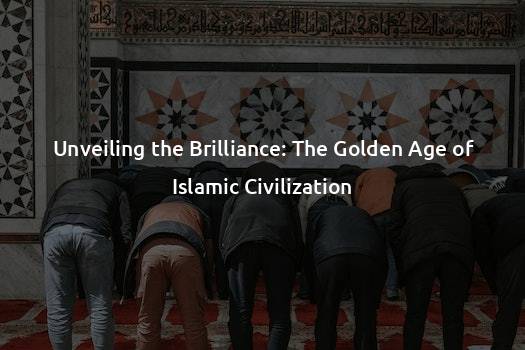Unveiling the Brilliance: The Golden Age of Islamic Civilization
Unveiling the Brilliance: The Golden Age of Islamic Civilization
The Islamic Golden Age, spanning from the 8th to the 14th century, was a remarkable period of cultural, scientific, and intellectual growth in the Islamic world. During this era, Muslim societies flourished, making significant advancements in various fields, including mathematics, chemistry, astronomy, medicine, philosophy, and art. This article will provide a glimpse into this golden phase and shed light on some of the key factors that contributed to its lasting brilliance.
The Pursuit of Knowledge
Education and the pursuit of knowledge played a central role in the Islamic Golden Age. Islamic scholars fostered an environment that encouraged intellectual exploration and the translation of ancient Greek, Roman, and Persian works into Arabic. This translation movement not only preserved these valuable texts but also made them widely accessible to scholars across different regions.
Medieval Islamic scholars, like Al-Kindi, Al-Farabi, and Ibn Sina, delved into various disciplines, promoting rational thinking and scientific inquiry. The House of Wisdom in Baghdad became a hub of knowledge, attracting scholars from diverse backgrounds and creating an atmosphere of intellectual curiosity and collaboration.
Advances in Science and Medicine
The Islamic world made groundbreaking discoveries and advancements in the fields of science and medicine during this era. Scholars such as Al-Razi (Rhazes) and Ibn Sina (Avicenna) made significant contributions to medicine, developing innovative treatments and medical theories. Their works, including the famous “Canon of Medicine” by Ibn Sina, became essential references for medical practitioners for centuries to come.
In the field of astronomy, scholars such as Al-Battani and Al-Farghani made extensive observations and calculations, which significantly improved our understanding of celestial bodies and their movements. Their findings laid the foundation for later developments in the field.
Mathematics also witnessed remarkable progress during this period. Muslim mathematicians, including Al-Khwarizmi and Al-Kindi, made pioneering contributions to algebra and introduced the concept of zero and the decimal numeral system, which revolutionized mathematics and had a profound impact on global scientific progress.
Art, Architecture, and Philosophy
The Golden Age of Islamic civilization also left a lasting mark on art, architecture, and philosophy. Islamic architecture, characterized by intricate geometric patterns, calligraphy, and ornate designs, thrived during this period. The Great Mosque of Cordoba, the Alhambra palace in Granada, and the Dome of the Rock in Jerusalem are exquisite examples of Islamic architectural mastery that still awe visitors today.
Islamic art expanded its horizons, blending diverse cultural influences, and developing its unique style. Calligraphy, miniature paintings, and decorative arts flourished, with many works reflecting religious themes and literary compositions.
Philosophy, too, experienced a golden era. Muslim philosophers, such as Al-Farabi, Ibn Sina, and Ibn Rushd (Averroes), made significant contributions to various philosophical fields, including metaphysics, ethics, and logic. Their works influenced European thinkers and played a crucial role in the Renaissance and the development of Western philosophy.
Legacy and Impact
The Golden Age of Islamic civilization left a significant legacy, which resonates even today. The translation movement initiated during this period not only preserved ancient knowledge but also acted as a bridge between different civilizations. These translated works, including those by Aristotle and Plato, enabled the transmission of valuable knowledge to Europe and sparked the intellectual revolution we now know as the European Renaissance.
The advancements made by Islamic scholars also had a profound impact on various scientific fields. Their contributions to mathematics, astronomy, medicine, and chemistry laid the groundwork for subsequent discoveries and advancements, forming a crucial part of the foundation upon which modern science stands.
TLDR;
The Islamic Golden Age was a period of remarkable cultural, scientific, and intellectual growth that spanned from the 8th to the 14th century. Islamic scholars fostered an environment of knowledge and intellectual exploration, leading to groundbreaking advancements in various fields. Science, medicine, art, architecture, and philosophy flourished during this era, leaving a lasting impact on subsequent civilizations. The translation movement initiated during this time preserved ancient knowledge and played a crucial role in the transmission of valuable information to Europe. The contributions of Islamic scholars laid the foundation for modern science and continue to influence our world today.







